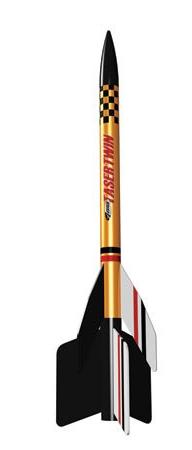| Construction Rating: | starstarstarstarstar_border |
| Flight Rating: | starstarstarstarstar_border |
| Overall Rating: | starstarstarstarstar_border |
| Diameter: | 0.74 inches |
| Length: | 15.40 inches |
| Manufacturer: | Estes  |
| Skill Level: | 1 |
| Style: | Multi-Stage |
 Brief:
Brief:
An easily assembled two-stage minimum-diameter rocket with a decent price tag.
Construction:
I purchased the kit at my local Wal-Mart for $6.96. It came in a corrugated cardboard box and consisted of three sections of body tube, a balsa nose cone, a sheet of laser-cut balsa fins, a combination upper thrust ring and tube coupler, a 24" long rubber band shock cord, a 30" plastic streamer, a lower engine block, and a sheet of waterslide decals. All parts were there and none were damaged.
Estes typical logical well-written instructions were provided. The kit went together with ease. There's very little to mess up. I used Aleene's Fast Grab Tacky Glue for the first time ever on this rocket, and I am sold on the stuff! In forty years as a rocketeer I have yet to find a better glue to use for model rocket fin installation.
This rocket had some really pretty white tubes with almost no spirals to fill. The fins and nose cone were of a particularly hard grade of balsa. I've noticed a lot of laser-cut fins are of harder balsa than I'm used to buying.
Solid design, simple to build, two stages...what's not to like?
Building PROs: Solid, nice tubes and balsa, low price.
Building CONs: When will Estes decide Kevlar is a good thing?
Finishing:
Nearly spiral-free tubes and hard, fine-grain balsa made finishing a snap. I deviated slightly from the design color scheme. I just left off the white. Decals were waterslide, thin enough to adhere well, but not the spectacular pain of the Interceptor-E. There were two sets of stripes intended to run chordwise along the non-black fin of each set; the ones intended for the upper stage fin were a quarter-inch too short to look like the pictures. Classy looking when done.
Finish PROs: Minimal spirals, hard balsa, simple but elegant paint scheme.
Finish CONs: Decal too short!
Construction Rating: 4 out of 5
Flight:
My first flight was with the B6-0/B6-6 combination. The motor retention was a bit unusual. There is an engine block in the tail end of the booster stage and the forward end of the upper stage. You must tape the motors together with cellophane tape then add masking tape above and below the motor stack to friction-fit. This results in a nearly glitch-proof staging; its sole drawback is that you have to improvise a connector to display the rocket.
Used four squares of Estes paper wadding. Little critter zoomed off the pad, staged at about two hundred feet, and continued on to 1100 feet. Landed on freshly-plowed field without damage after deployment right after apogee.
Two other flights on the same motor combination were nearly as perfect; final flight of the three went to 1200 feet and landed in the Caliche County road near our launch field where the Taser Twin proved how tough she was. No damage!
Recovery:
Booster tumbled down right next to the pad in each case. Streamer recovery works fine for this little rocket. A parachute would guarantee a long hike on a day with any wind at all.
This rocket's recovery harness could really benefit from the addition of Kevlar so you could tie a knot in it and slip it into the upper-stage body-tube joiner.
Flight Rating: 4 out of 5
Summary:
This is an excellent little two-stager for an excellent little price. It reminds me a lot of Estes' old Apogee II minus the payload section. It cries out for the addition of Kevlar® and the reintroduction of A8-0 and A8-5 rocket motors because of its obvious light weight. I resisted the temptation to load a C6-0/C6-7 pair. The field would have probably been big enough, but this rocket was hard to track at 1200 feet.
Overall Rating: 4 out of 5
 |
 |
Flights
 |
 |
J.R.B.III (July 19, 2009)
Sponsored Ads
 |
 |












C.S. (July 16, 2009)